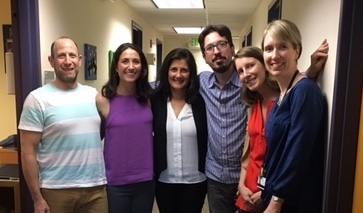The Social Communication, Historical Exclusion, Memory and Affect (SCHEMA) Study 1.0
The SCHEMA 1.0 project aimed to understand the effects of emotional and social cues on memory, and how they might differ as a function of autistic traits. The study comprised an online memory paradigm that measured item memory and associative memory, as well as a battery of psychological and cognitive questionnaires. The memory paradigm asked participants to remember and then recall a series of images that were pre-assigned to one of four categories: neutral social, neutral non-social, negative social, or negative non-social.
In our sample of 706 young adults, we found that high levels of autistic traits were associated with poorer recognition memory and associative memory for neutral social images. This may well reflect a cognitive bias among those with greater autistic traits, such that negative social memories are more salient and easier to contextualize than neutral social memories. These findings suggest that poorer mental health outcomes among those with high autistic traits may be due to cognitive vulnerabilities related to memory processing.
This project was funded by the Social Sciences and Humanities Research Council of Canada (SSHRC) and the UBC Faculty of Arts AURA Award.
ACES Study (Assessing Childhood Exclusion and Stress)
The ACES project was a study that aimed to develop better tools to explore the impact of stressful childhood experiences on autistic and non-autistic teens and young adults. To do this, we designed and trialed a novel measure of stressful life events in hopes of understanding how best to ask about these kinds of difficult experiences. Participants included autistic youth and their parents, who completed online questionnaires and an in-person semi-structured interview that asked about past traumatic experiences. They were also asked about their experience of answering the questionnaire and interview questions, which helped us refine the measure to be as accessible and effective as possible.
This project was funded by the Hampton Fund Research Grant in the Humanities and Social Sciences.
CAAS (Childhood Adversity and Autism Study)

The CAAS aimed to create a brief questionnaire and a semi-structured interview of potentially traumatic events and related symptoms in individuals on the autism spectrum. The study is complete and the questionnaire is now being used in other ASAP Lab research (see the ACES project).
Click here to learn more from Dr. Kerns about the relationship between autism, childhood adverse experiences, and mental health risk factors.
PAPA Project (Phenomenology of Anxiety in Preschoolers with Autism)
The PAPA project was a collaboration with Kennedy Kreiger Institute investigating anxiety in preschoolers on the autism spectrum. Click here to learn more.
Image: PAPA Research Team at the Center for Autism and Related Disorders, Kennedy Krieger Institute, Baltimore MD May 2018 – People: Stewart Mostofsky, Connor Kerns, Roma Vasa, Giacomo Vivanti, Catherine Johnson, Amy Keefer.

TAASD Trial (Treatment of Anxiety in Autism Spectrum Study)
The TAASD Trial was a three-site trial investigating the efficacy of a modular CBT protocol for anxiety among those on the autism spectrum. The researchers compared BIACA, Coping Cat, and TAU, three treatments for Anxiety and its ability to treat participants on the spectrum. This trial took place at the University of California Los Angeles (UCLA), University of South Florida (USF), and Temple University (TU). This study is completed and has published its results. Click Here to read more.
UCAS Study (Usual Care in Autism Survey)
With a significant gap between research and practice in mental health services for youth on the autism spectrum, the UCAS was developed to capture the depth and breadth of practices for autistic youth and attitudes of community-based providers. This study is completed and has published its results. Click Here to read more.
APP (Autism Phenome Project)
Starting in 2006, the APP aims to define clinically meaningful subtypes of autism. By identifying specific markers more effective diagnosis and treatment can be achieved. The APP has had more than 300 families participate in this study and it has become the worlds largest and most comprehensive research project into children on the spectrum in the world. Click here to learn more.